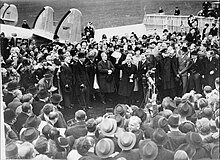Peace for our time
Peace in our time or peace for our time was a statement made by the Prime Minister of the United Kingdom Neville Chamberlain in his speech of 30 September 1938 the Munich Agreement the subsequent Anglo-German gave and explanation.
The phrase is a quote from Benjamin Disraeli , who declared on his return from the Berlin Congress in 1878 : "I have returned from Germany with peace for our time". It is remembered primarily for its ironic value: Less than a year after the agreement, Hitler's sustained pressure to return the Polish corridor and the attack on Poland were followed by declarations of war by France and Great Britain on Germany.
It is often erroneously quoted as "Peace in Our Time", which appeared long before in the Book of Common Prayer as "Give Peace in Our Time, O Lord", probably based on the 7th century hymn "Da pacem Domine! in diebus nostris, alleluia ". It is unknown how deliberately Chamberlain used this.
Chamberlain's plane landed at Heston Airfield on September 30, 1938 , and he said to the crowds there:
"The solution to the Czechoslovak problem that has now been achieved is, in my view, only the prelude to a larger settlement in which all of Europe can find peace. This morning I had another conversation with the German Chancellor, Herr Hitler, and here is the paper that bears his name and mine. Some of you may have heard what it contains, but I just want to read it to you: ... We consider the agreement signed yesterday evening and the German-English naval agreement to be symbolic of the desire of our two peoples never to wage war against each other again "
Later that day, he stood at 10 Downing Street and read the document again and concluded:
"My dear friends, for the second time in our history a British Prime Minister has returned from Germany and brings peace with honor. I believe it is peace for our time. We thank you from the bottom of our hearts. Go home and sleep yourself." extensively from "
Chamberlain's return was not well received everywhere. 15,000 people protested against the Munich Agreement in Trafalgar Square on the same day , three times as many as welcomed it at 10 Downing Street. Because of Chamberlain's continued manipulation of the BBC , this news was largely suppressed at the time. Labor spokesman Hugh Dalton publicly hinted that the paper Chamberlain waved was " torn from the pages of Mein Kampf ."
Individual evidence
- ^ Neville Chamberlain's "Peace For Our Time" speech
- ^ The Order for Morning Prayer. Retrieved May 4, 2020 .
- ^ A b Neville Chamberlain's "Peace For Our Time" speech - EuroDocs. Retrieved May 4, 2020 .
- ^ Frank McDonough: Neville Chamberlain, Appeasement, and the British Road to War . Manchester University Press, 1998, ISBN 978-0-7190-4832-6 ( google.com [accessed May 4, 2020]).
- ↑ Internet Archive: The early Asimov; or, Eleven years of trying . Garden City, NY, Doubleday, 1972 ( archive.org [accessed May 4, 2020]).
